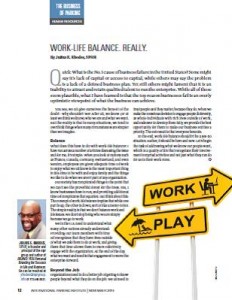Quick: What is the No. 1 cause of business failure in the United States? Some might say it’s lack of capital or access to capital, while others may say the problem is a lack of a defined business plan. Yet still others might lament that it is an inability to attract and retain qualified talent to run the enterprise. While all of those seem plausible, what I have learned is that the top reason businesses fail is an overly optimistic viewpoint of what the business can achieve.
You see, we all give ourselves the benefit of the doubt—why shouldn’t we? After all, we know (or at least we think we know) who we are and what we want. But the reality is that in many situations, we tend to overthink things when many circumstances are simpler than we imagine.
Balance
What does this have to do with work-life balance? I have run across a number of articles discussing the issue and for me, it’s simple. When you look at nations such as France, Canada, Germany, Switzerland, and even Mexico, employees are given adequate time off work to enjoy what we all know is the most important thing in life: time to be with and enjoy family and the things we like to do when we aren’t part of any organization.
Our society has complicated things to the point that we can’t see the proverbial forest for the trees. Yes, I know businesses have to run, and providing additional time off complicates that equation. But think about this: The concept of work-life balance implies that while one part is up, the other is down, sort of like a teeter-totter. The simple reality is that we don’t balance work and life issues. We don’t stop being who we are simply because we go to work.
We in the U.S. need to understand what many other nations already understand: Providing our team members with time off recognizes that they have lives outside of what we ask them to do at work, and giving them that time allows them to more effectively engage with the organization. At the end of the day, what we want and need is that engagement to move the enterprise forward.
Beyond the Job
Organizations need to do a better job of getting to know people beyond what they do on the job. We all need to treat people as if they matter, because they do. When we make the conscious decision to engage people differently, as whole individuals with rich lives outside of work, and endeavor to develop them fully, we provide the best opportunity for them to make our business entities a priority. The net result is that everyone benefits.
In the end, work-life balance shouldn’t be a yes-no situation. Rather, it should be here and now. Let’s begin the task of addressing what we know our people want, which is a quality of life that recognizes their involvement in myriad activities and not just what they can do for us in their work roles.
Julius E. Rhodes, SPHR, is founder and principal of the mpr group and author of BRAND: YOU Personal Branding for Success in Life and Business. He can be reached at jrhodes@mprgroup.info or 773.548.8037.
TPP-2014-11-Work-Life Balance. Really.

